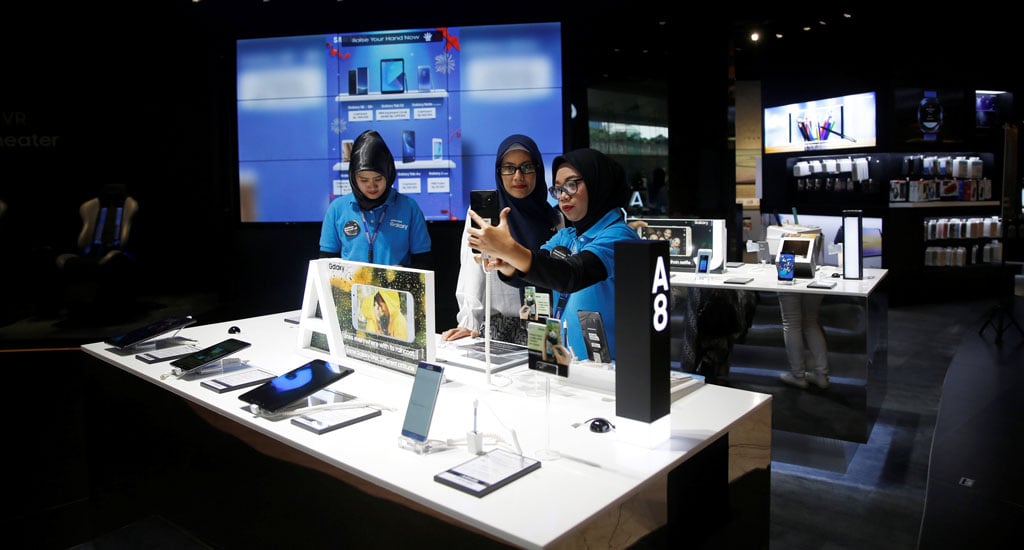February 22, 2018
Version in 中文 (Chinese), baˈhasa indoneˈsia (Indonesian)
[caption id="attachment_22768" align="alignnone" width="1024"] A salesperson shows a customer the latest smartphones in a showroom in Jakarta, Indonesia: the use of mobile internet services continues to grow rapidly in the country (photo: Beawhiharta/Reuters/ /Newscom).[/caption]
A salesperson shows a customer the latest smartphones in a showroom in Jakarta, Indonesia: the use of mobile internet services continues to grow rapidly in the country (photo: Beawhiharta/Reuters/ /Newscom).[/caption]
With the third largest youth population in the world and 130 million active social media users, Indonesia is poised to become the biggest digital economy country in Southeast Asia. To fully embrace the digital opportunity, Indonesia must enhance its infrastructure and increase internet penetration to lift economic growth and productivity.
According to a McKinsey report, digitization could expand Indonesia’s economy by 10 percent of GDP and add 3.7 million jobs by 2025.
As the figure shows, Indonesia’s digital landscape has expanded in recent years—ranging from increased use of big data and mobile internet, to the rise of digital financial services and e-commerce. The use of big data and advanced analytics increased by 60 percent between 2014 and 2015, while the number of mobile internet users grew by 13 million (more than 20 percent) between 2015 and 2017.
Digital momentum
There has also been a large shift towards digital financial services—a promising development that can support financial inclusion given that the country houses the third largest unbanked population in the world. For instance, an Indonesia Banking Survey performed by PricewaterhouseCoopers shows that the number of people who mostly banked through traditional branches (over 50 percent of their total transactions) dropped from 75 percent in 2015 to 45 percent in 2017.
And digital transactions are growing rapidly. E-money, which is mostly used by lower income individuals, has almost quadrupled between 2014 and 2017, while revenues from e-commerce grew by 22 percent between 2016 and 2017.
Indonesia’s growing youth population is a fast adopter of these technologies and constitutes a sizeable customer base for the digital economy. The country has over 1,700 digital startups to show for it—trailing only behind the United States, India, and United Kingdom.
For example, Go-Jek, which was established in 2010 as a motorbike ride-hailing phone service with a fleet of twenty drivers, evolved into a popular on-demand mobile platform. The “super app,” as it has been coined, now provides a wide range of services, including transportation, mobile payments, and food delivery with a fleet that exceeds 400,000 drivers.
Expanding the digital opportunity
Still, the country faces a digital divide, that is halting progress. For example, with only a quarter of the overall population using the internet, Indonesia has one of the lowest internet penetration rates in the ASEAN region. And while internet is affordable in Indonesia, average quality, including the size of the bandwidth per user and the average connection speed is low.
The recent IMF annual economic assessment report focused on reforms that support innovation and job creation to boost potential growth and economic diversification in Indonesia.
Particularly for the digital economy, these priorities focus on:
- Enhancing the country’s infrastructure to access information and technology.
- Upgrading workers’ skills—particularly digital literacy—to meet the demands of the digital economy.
- Streamlining regulations and encouraging the entry of foreign firms and skilled labor to further boost competition and stimulate innovation.
Managing risks
The rise of the digital economy also comes with a number of risks, including cyber risks. Large-scale automation can accelerate job destruction and raise income inequality. In the financial sector, emerging technologies, including virtual currencies, could disrupt established financial institutions and lead to a migration of financial activities outside the regulated sector.
By striking a balance between addressing risks from digitalization and supporting innovation, policies
can help Indonesia reap the digital dividends.
To discuss how to tackle these challenges, Bank Indonesia and the IMF are organizing the New Growth Models in a Changing Global Landscape high-level conference in Jakarta on February 27, bringing together renowned policymakers and thinkers.
Indonesia will also have the opportunity to continue showcasing the country’s digital transformation as host of the upcoming 2018 IMF-World Bank Annual Meetings.
For further reading:
IMF’s latest annual economic assessment for Indonesia
Creating Jobs for Indonesia’s Youth: Five Charts That Matter





